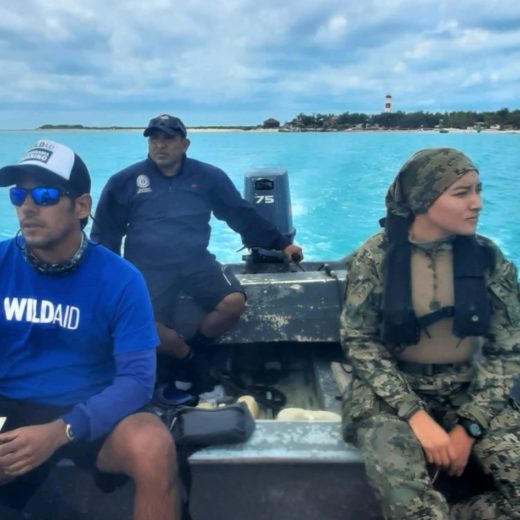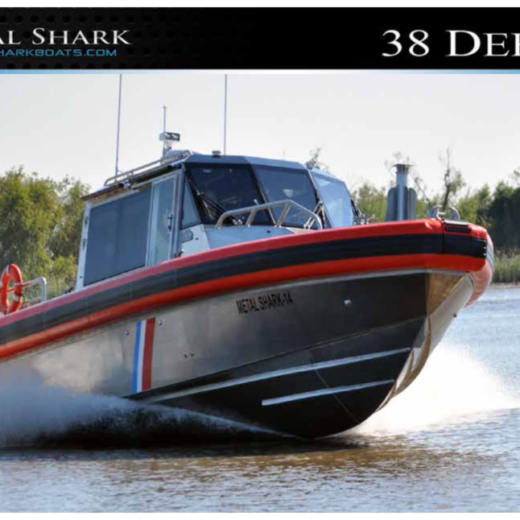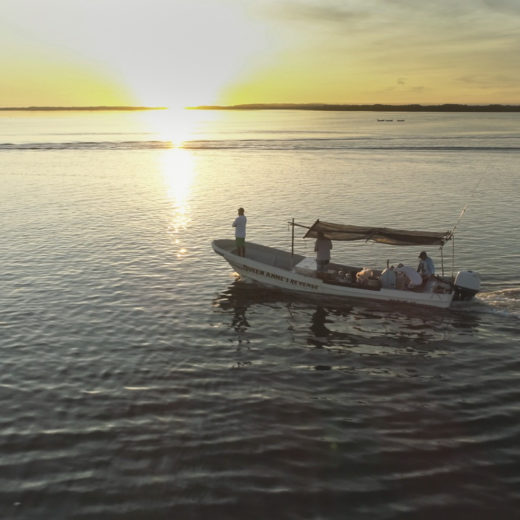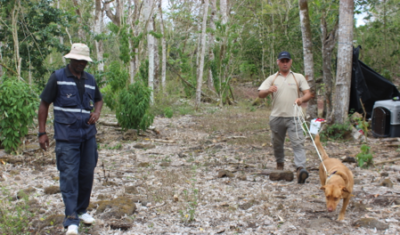
BY SILVIA SANCHEZ BOR, WILDAID MARINE PROGRAM
Invasive species pose one of the greatest threats to the conservation of the Galapagos Islands. That’s why together with the Galapagos Conservancy, WildAid helped the Galapagos Biosecurity Agency (ABG) form a specialized canine unit to protect these unique islands from invasive species.
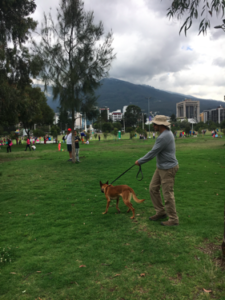

In 2016, we selected and trained two dogs and three handlers, as well as constructed the necessary infrastructure (kennels and offices) for the unit. The canine unit will provide a versatile and low cost method of detecting illegal substances to prevent their entry into the Galapagos archipelago.
The first stage of the training was done in Quito, where the dogs spent three months training in the identification of nine odors selected by the ABG because they are prohibited from entering the Galapagos, but are commonly found on passengers attempting to smuggle them onto the islands, including oranges, dragon fruit, and passion fruit.
The dogs were tested on their success in detection and their adaptability by identifying the odors in different locations. Unfortunately, one of the canines presented some skin sensitivity issues during this phase and had to be returned to the organization Cobra Canina for a replacement. The new canine is expected to arrive in the next few months.
The second phase of the program was done in Santa Cruz Island in the Galapagos and consisted in the selection and training of canine handlers. A pool of 11 candidates underwent a rigorous selection process, and of those we selected three canine handlers. The process included basic personality tests, psychomotricity tests (the relation between mental and physical processes) and other aptitude tests to select the best candidates.
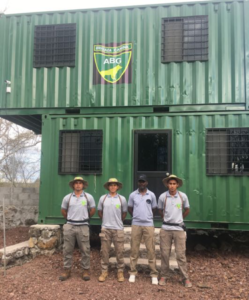

After their selection, the three candidates were trained in basic care and maintenance of the canines and their kennels, storage of scent samples, canine handling techniques for detection of target scents including general search strategies in large areas, open areas, closed areas, proper walking techniques and reintroduction of scents.
Over the next few months, we will conduct onsite training at airports and ports for the canine teams and problem correction, as well as conduct initial training for the replacement canine from Cobra Canina for his introduction to the unit. The unit will officially launch in April with three handlers and two canines.
Thanks to the support of IGTOA and the Helmsley Charitable Trust, as well as our partners Galapagos Conservancy and the ABG, this canine unit will act as a strong and unobtrusive tool in the identification of hidden organic products in passenger luggage and cargo upon entry to the archipelago. The prevention of these products, along with our work in biosecurity in the Galapagos, could signify a decrease in the spread of invasive species or diseases that could affect the biodiversity, human health and agricultural development of the Galapagos Islands.
Español
Brigada Canina Para Prevención de Especies Invasoras en Galápagos
A nivel mundial existen dos herramientas conocidas por el hombre para la detección y localización de substancias ilegales; la primera es la utilización de equipos tecnológicos como los rayos x; y la segunda es el uso de canes adiestrados de detección, los cuales son una herramienta versátil, accesible y de bajo costo.
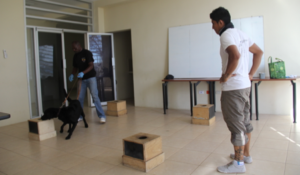

La Agencia de Bioseguridad Galápagos con la colaboración de WildAid y Galápagos Conservacy inició durante el año 2016 la conformación de una Unidad Canina de la ABG con el objetivo de resguardar el Patrimonio Natural de las Islas Galápagos frente a la introducción de especies exóticas. Durante el año 2016 se apoyó en la construcción de la infraestructura de la BriCan, así como con el asesoramiento técnico para selección y entrenamiento de guías y canes; así como la formación de equipos de trabajo (hombre-can) de detección de productos ilegales.
La primera etapa de entrenamiento se realizó a los canes en la ciudad de Quito, los cuales durante tres meses estuvieron en un proceso de adaptación e introducción de olores; para esto, La ABG seleccionó nueve productos de origen animal y vegetal que no está permitido su ingreso a las Islas Galápagos y que tienen una alta incidencia de retención en sus puntos de control, estos productos son: naranja, pitajaya, mango, cereza, queso fresco, lana de borrego, palo santo, semillas de chía y granadilla.
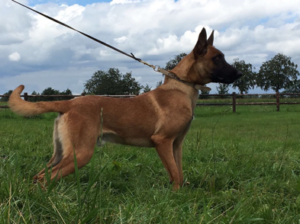

En esta etapa también se probó la efectividad de los canes en detección y adaptabilidad con el entorno y el can VINA-LABRADOR presentó problemas de sensibilidad en su piel por lo que fue devuelta a la empresa Cobra Canine para su remplazo.
La segunda etapa de entrenamiento se realizó en Santa Cruz Galápagos y comprendió dos fases: a) selección de manejadores de canes, b) entrenamiento guías y formación de equipos detectores.
Primera fase: Se seleccionó a los manejadores de canes (inspector guía) y para lo cual el instructor realizó una rigurosa selección con pruebas de personalidad básica, test de psicomotricidad, entre otras aptitudes, luego de este proceso fueron seleccionados 3 de los 11 postulantes.
Segunda Fase: Durante esta fase se instruyó a los tres postulantes seleccionados en: técnicas de cuidado básico de los ejemplares caninos, mantenimiento de caniles, mantenimiento de canes, almacenamiento de olores, técnicas de manejo de canes para detección de olores: búsqueda general en áreas de superficies grandes, búsqueda en áreas abiertas, búsqueda en lugares cerrados, forma de caminar, forma de usar la traílla, reintroducción de olores).
En los próximos meses se continuará con la Asistencia Técnica permanente en el entrenamiento in situ (aeropuerto y puerto) de los guías y canes, corrección de problemas y se incorporará un nuevo can de detección la Unidad Canina. Se estima que el mes de abril se realizará el lanzamiento oficial de esta unidad la cual estará conformada por; tres manejadores de canes (guías) y dos canes detectores.
Gracias al apoyo de Helmsley Charitable Trust, IGTOA, Galapagos Conservancy y la ABG, esta Unidad Canina será una potente herramienta de inspección no intrusiva en carga y equipajes acompañados de pasajeros, su función será “identificar productos orgánicos ocultos en el equipaje de pasajeros y/o carga que ingresan a las Islas y que puede significar la introducción de productos con riesgos de plagas vegetales o enfermedades animales que afecten la biodiversidad, salud humana y el desarrollo agropecuario de las islas Galápagos”.
Stay in touch and get the latest WildAid updates.
SIGN UPAbout WildAid
WildAid is a non-profit organization with a mission to protect wildlife from illegal trade and other imminent threats. While most wildlife conservation groups focus on protecting animals from poaching, WildAid primarily works to reduce global consumption of wildlife products such as elephant ivory, rhino horn and shark fin soup. With an unrivaled portfolio of celebrity ambassadors and a global network of media partners, WildAid leverages more than $308 million in annual pro-bono media support with a simple message: When the Buying Stops, the Killing Can Too.
Journalists on deadline may email communications@wildaid.org
